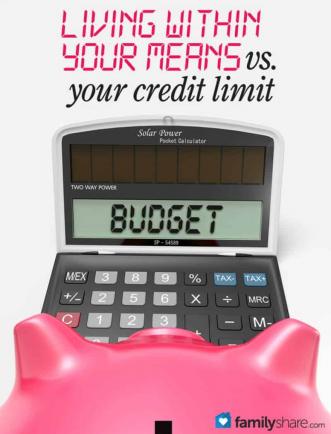
What are our means we're supposed to be living within? For financial purposes, this is your take-home pay. We live in a world that revolves around credit cards and their credit limit that can easily turn into a financial burden if used as a source of income. The following steps will help you enter the world of credit without becoming a victim of your credit limit.
Budget is not a bad word
One of the most important financial tools you'll need is a budget. We were first introduced to the budget in a financial class given by church leaders. It has been part of our finances ever since. A budget is as individualistic as you are. When working your budget, budget for your needs and save for your wants. Remember a budget shows you how you intend to or are spending your take-home pay. Take-home pay is the money earned after taxes and deductions and doesn't include credit card or line-of-credit limits.
Kiplinger, trusted for their personal and business finance advice, offers a great online budget tool. Our budget categories are slightly different. The first group is our income, take-home pay. The second group includes our tithes and offerings to our church as we obtain Malachi's promise to "open you the windows of heaven, and pour you out a blessing, that there shall not be room enough to receive it. (Mal. 3:10)"� The third group includes the monies put into savings so we can afford to purchase wants and meet unexpected financial burdens. The remaining groups are similar to Kiplinger's budget tool and include common bills such as telephone, electric, water/sewer, etc.
Dave Ramsey, a personal money-management expert, recommends a Zero-Based Budget where every dollar is accounted for. Like Dave Ramsey's budget, we did and do our best to account for all our spending, but we have never paid attention to what percent of our income is spent in each category, except for tithing to church. We track our spending with QuickBooks. You can track your spending online at places such as mint.com.
I'm drowning in debt
When we married, one of the hardest lessons to learn, and the one that caused us the greatest financial burden, was seeing the beautiful homes our families lived in and the stuff that filled them. We didn't consider the fact our parents started out small and frugal. Soon we were seriously in debt with our home full of stuff, but unable to pay, even though I worked three jobs.
My husband and I filled out our budget sheet. We couldn't understand how we'd made it that far. Our church leader recommended paying off our credit card and the revolving line of credit by finding extra money from some of the other categories. We ate out less and discovered how much we loved home cooked meals. It didn't hurt our weight, either. We also cut coupons for more savings and prepared meals around the sales at our local grocery store.
While we were eliminating our debt, we replaced worn or broken items with used ones or refurbished them ourselves. If we deemed it unnecessary, we went without. Once our finances were stable, we did and still do not buy anything we can't pay for with cash. (We see no problem with the following debt as long as it's included in the budget and, when possible, paid off as soon as possible - home, education and a car. That said, to date, we have purchased our cars with cash and have not had a car payment in over 15 years.)
Debt elimination
What if your budget says your take-home pay is not enough, and you can't find money by cutting some purchases? You have some choices. Call your debtors and work out a lower interest rate. Or you may find you need to temporarily work an extra job. How did we get rid of our debt?
Our church leader recommended a program similar to Dave Ramsey's Get Out of Debt with the Debt Snowball Plan._ Unlike his plan that recommends attacking the lowest debt and rolling-over to the next one debt at a time, we paid extra to all our debts and rolled-over payments to the highest debt as each debt was paid. Accelerating our payments changed total repayment time from 279 months, about 23 years, to about four years. Now, we each are working one job and mine is in the home. (I still use this payment plan to pay medical bills to meet our deductible exactly as Dave Ramsey recommends.)
Yes, we have credit cards. No, they aren't maxed out, but they are part of our budget. All our personal debt, except our home, is paid in full. You, too, can be debt-free if you consider, plan and follow a budget. Even if you're drowning in debt now.

